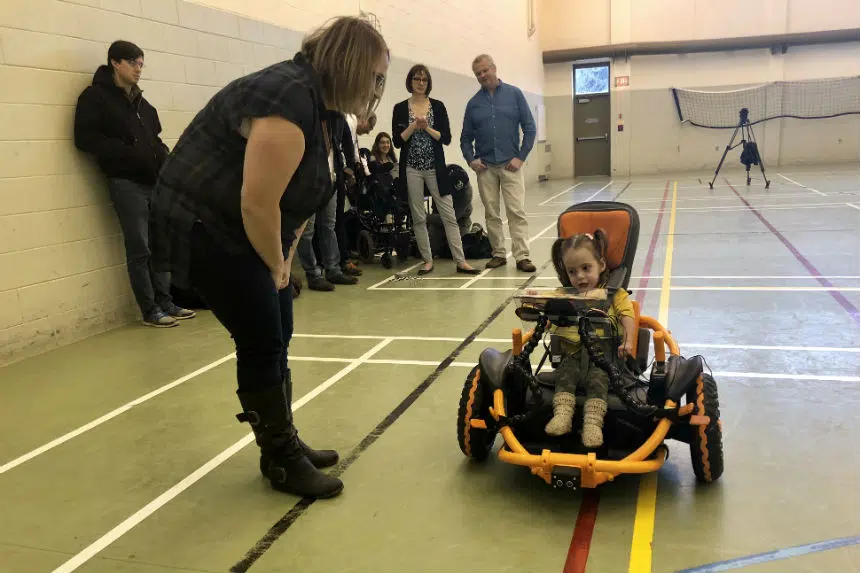The University of Regina has teamed up with the Wascana Rehabilitation Centre to help give children with mobility challenges the freedom to safely explore their surroundings via modified ride-on cars.
About a year and a half ago, graduate students in the Faculty of Engineering and Applied Science began modifying the toy cars. They reduced the speed, added a microprocessor to make it digital, along with sensors to help detect stairs and curbs. Pads with coloured buttons were also added, giving kids the chance to direct where they’d like to go.
According to Kim Schaan, occupational therapist at Wascana Rehab, the cars help children with mobility issues become physically, socially and emotionally stronger.
“This gives them a way to learn how to drive a vehicle — something their neighbours and siblings are driving, and get ready for that big responsibility of a wheelchair. Then we know what kind of adaptations we need to make to that power wheelchair when they’re older and ready for it,” she explained.
.@UofRegina engineering students have teamed up with Wascana Rehab to create modified ride-on cars to give young kids with mobility issues freedom to explore their surroundings in a safe way. #yqr pic.twitter.com/TzZXWMv1mD
— Jessie Anton (@jessieanton_) December 18, 2017
Julie Buium said the modified cars offer her two-year-old daughter, Khyla, who has cerebral palsy, a playful sense of independence.
“When she gets the opportunity to play like this, it makes it almost more desirable and so hopefully then she’ll try harder to move her muscles and hold her head and do these things because it is fun,” said Buium.
“Hopefully her future will be bright if we can keep offering these types of things.”
Professor asks for funding
Modifying more of the ride-on cars is the goal of Raman Paranjade, an electronics engineering professor at the University of Regina, who directed the crew of graduate students. However, he said it’s not timely without funding.
“The sad truth is we’re doing this on the side of our desk. We don’t have any funding for this project and we’re just volunteering time and volunteering whatever parts we can purchase from scraps,” said Paranjade.
“We’d really like to see some support and the speed in which we’d be able to bring equipment and make it available would increase dramatically.”
Ideally, Paranjade said he’d like to have $30,000 in funding for graduate students to work on these modified ride-on cars throughout the year.
It’s his vision that one day they could have enough vehicles to lend out to families, in addition to being able to use them at Wascana Rehab. Eventually, Paranjade is also hoping to use the cars as tools to study the progress of the kids using them.
In the meantime, the faculty plans to modify a toy dump truck. Paranjade said they’ll match the vehicle up with a graduate student in the winter semester.











